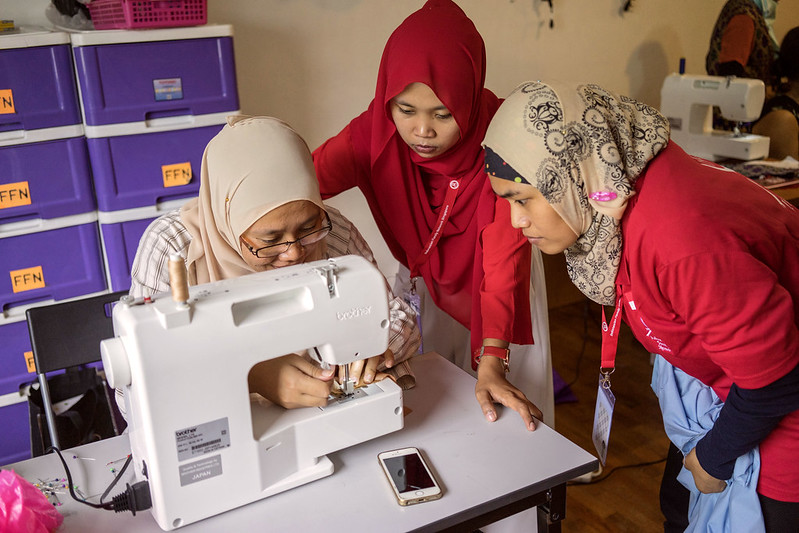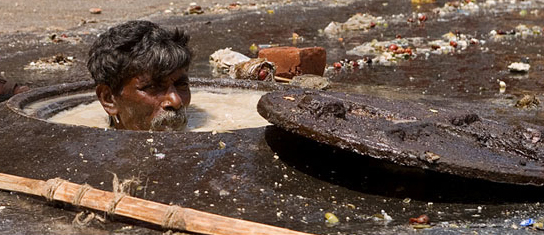I was a waitress for three and a half years at an Indian restaurant in San Francisco in the early 1990s. Having been brought up in a privileged family in Bangalore, the ‘waiting’ on people was a novel experience for me. I was excited though as it was my first job abroad and I saw it as performing a part. We waitresses had to wear salwar kameez, traditional Indian attire, and namaste people as they entered. When the restaurant closed each night, the staff got to eat their dinner for free before heading home. There was a ritual to that. The owners, an old Gujarati couple, sat at the front desk, the waitresses and the cooks ate their meals on the floor of the kitchen, and the Mexican dishwasher had his dinner in the backroom storage space. What now strikes me as odd was how quickly I slipped into this social arrangement. At the time, it did not occur to me to ask why we didn’t all just sit at the table and eat together, using the nice restaurant cutlery.
Dirty work, dirty people?
It is easy to fall into the explanation of the Indian caste system as a way of sorting ‘our worth’ based on the ‘purity’ of our occupation, ‘once a servant, always a servant’ logic. This was one of the most imaginative social ordering inventions of rationalizing group hierarchies along arbitrary principles, including that of occupation. This system of applied status has somehow stood the test of time and persists in the global and modern economy.
What is remarkable is how this valuation of human virtue based on the work we do has manifested across the world, albeit in different ways. For instance, Sara Asselman, a researcher at the City University of New York, paints a vivid picture of Filipina domestic workers’ struggle for respect and recognition in Morocco as what they do is largely considered “dishonorable work”. The stigmatization that comes with engaging in the economy of care has an added ethnic dimension in this context, given that majority of their domestic workers are migrant women from the Philippines.

Naturalizing an entire group of people based on their gender, ethnic and citizenship status as intrinsically adept at a given industry and simultaneously degrading that industry as ‘lesser than’ has served the political economy of global supply chains through reduced wages. We see this through the circulating of global clichés, from women as naturally good at care work, to Chinese as not the ‘creative type’ but the ‘manufacturing type’. As Carly Fiorina, a former boss of Hewlett-Packard argued in The Economist interview:
“YEAH, the Chinese can take a test, but…they’re not terribly imaginative. They’re not entrepreneurial. They don’t innovate—that’s why they’re stealing our intellectual property.”
The social labelling of entire groups as innately good or bad at certain kinds of work, becomes more complicated as the ‘virtue’ of that work shifts over time. If we follow social progression over the ages, under traditional Judeo-Christian beliefs, work was considered penance for Adam and Eve’s disobedience. Greeks viewed work as a curse while Romans saw artisanal work as “vulgar.” The Protestant Reformation of the 16th century turned this around, webbing as Max Weber argued, morality and virtue to an ‘honest day’s work.’ As Gayle Porter, Organizational Change Management scholar explains, “the meaning of work has varied across time and culture – a curse, a calling, a social obligation, a natural activity, a means to better life, or simply what we do because we have to.”
Respecting “disgusting work”
Choice is a privilege. In Corona times, the choice of work is an astounding luxury to most people, particularly in precarious and vulnerable contexts. According to the Kenya National Bureau of Statistics (KNBS) more than 1.7 million Kenyans lost their jobs in the first three months of the pandemic. The Kenyan government is offering hundreds of thousands of such citizens alternative urban maintenance jobs, many of which are considered undignified work. In Kibera, one of the largest informal settlements in Nairobi, Abdul Aziz, a driver who lost his job, scoops up plastic bottles, dirty nappies, and garbage from the open sewer, trying his best to dodge the “flying toilets” of human faeces that is swung out from homes while he toils. “It’s disgusting work,” says Aziz, but he recognizes that it’s still better than staying at home, “hungry and jobless.”

Inserting honour in this equation is perverse. Yet, this social ‘quality’ that somehow people at the margins have found themselves needing to defend and to preserve seems to accompany several types of jobs they engage with, such as tailoring, butchering, artisanal work, domestic care, and sanitation. But, what is honour though? It is a resource that can be accumulated and/or reduced based on established behavioural codes, signalling one’s inherent worth. These codes are often distinctly gendered across societies. In honour cultures, typically women working outside the house, and with and alongside strangers, is looked upon with “a tinge of immorality”—shop girls, daytime security personnel, airline hostesses, traffic cops, beauty technicians, tuk-tuk drivers, and even as trekking guides.
The management of reputation has become even more confounding as women workers are compelled to take to social media platforms, as in the case of Bangladesh garment workers to resell wares. Given that honour can be taken away by inappropriate and visible behaviour, social media poses specific and new forms of threats for women as they struggle to manage their self-impressions online while conducting their day to day work activities. Katy Pearce, a communications scholar from University of Washington captures the spectrum of fears as young women in the ‘honour culture’ of Azerbaijan go online. The ‘right’ women’s behavioural codes require them to be modest, quiet, decent, and chaste, else they would bring dishonour to their families and communities. One of her participants shares her experience of regularly receiving disapproving comments on every Facebook post—even if just a photo of a sunset—saying things like, “Don’t you have anything better to do?” Eventually, she blocked most of her friends and family members to avoid the harassment, although that resulted in her self-ostracism.
Online tactics of manufacturing honour
While social status can appear as frozen and immovable, collective ingenuity and socio-technical change can open pathways to game the system in ways that can help women workers manufacture and acquire honour for themselves and their group of belonging.
In Nepal, many rural women have moved to the city to work and send money home. Kabita, a first-generation wage earner is a case in point. She works as a tourist guide and is aware of the thin line she treads as she interacts with “open” lifestyles of the city in terms of social freedoms, perceived as dishonourable to her community. While she enjoys the pleasure of being independent, she crafts her identity online to show to her family back home that she is still a “good girl” through her modest choice of clothing. Further, she leverages on the digital remittance economy, a conventional pathway for earning honour by sons who send money back home and make their families proud. The “assumption is that a daughter engaged in a ‘dishonorable’ profession would be too ashamed to send any of her earnings to her parents,” argues Barbara Grossman-Thompson, International Studies scholar at California State University Long Beach.
Other strategies by women workers to manage their “honour” has been to obscure their identities by using stock photos for their profiles, self-censorship, posting only about “serious things” and business related matters, and holding often multiple accounts, handles and profiles. Collective self-presentation is also important as women work together to manufacture the reputation of their industry, their work and thereby themselves through tactical tagging and sharing with the right social networks to reinforce certain impressions of their work to those back home.
While these tactical collectives are impressive, what we should really aim for is to dismantle the notion of honour, as historically and culturally constructed as individual virtue/vice dependent on the work we do. No human being should be valued based on what work they engage in, rather it should be on the level of integrity they bring to that job, whether as a sweeper in Bangalore or a Wall street executive in New York. Do we need this added layer of self and group degradation in the face of precarity and misfortune? Given that human beings can’t help but imbibe meaning from their toil, can we move away from a template that devalues us by what we do and instead fuel an alternative paradigm that centres on the dignity of labour?
As long as honour holds a place in the world of labour, it will always serve as a cancer that eats into the fabric of human dignity.
—




